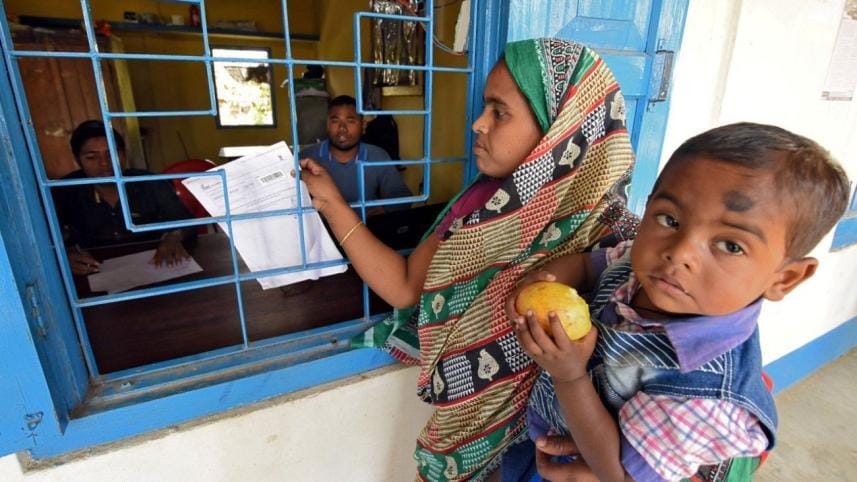NRC issue in Assam and our security concern

The ongoing registration of citizens in Assam first came to the limelight during the Indian national election campaign in 2014, when BJP Chief Narendra Modi announced in election meetings that if voted to power, the BJP would evict those he called "Illegal trespassers from Bangladesh". BJP's current President Amit Shah went a step further and during the May 2016 election campaign for Assam State Assembly declared that while his government would allow Hindu migrants from Bangladesh to settle in India, the Muslims will be pushed out.
Many in Bangladesh took this as empty rhetoric aimed at Hindu voters. However, when BJP came to power in Assam, they restarted the long-stalled NRC process. A part of the draft NRC was released on the midnight of December 31, 2017, and subsequently on July 30, 2018, the full draft of the NRC was released. It appeared that out of about 35 million who had submitted papers for citizenship registration in Assam, over 4 million were rejected.
These are the people who could not prove that they had been living in Assam or had been citizens of India before midnight of March 24, 1971, the cut-off date for inclusion in the NRC. It can be presumed that the bulk of these so-called "illegal trespassers from Bangladesh" are poor Muslim farmers who had settled in the Brahmaputra valley in Assam many generations ago. Although the central government is saying that the NRC list is only a "draft" and there is a provision of appeal all the way to the Supreme Court, for an ordinary individual, who is likely to be herded to a deportation camp, seeking justice from the Supreme Court will remain a far cry.
With BJP using the NRC process as an election trump card, we cannot ignore the worst-case scenario of a human onslaught on our border by evicted Muslims from Assam. As recently as September 11, the BJP Secretary General has said that those excluded from the NRC will be "detected, deleted and deported". And one can imagine where! In fact, the Assamese example may encourage other states to start their own NRC process. We can no longer ignore the jingoistic threats coming out of mid and high-level BJP politicians, many of whom see the migrant population as having links to various Islamist terror organisations. Where do these people then go, except crowd along the Indo-Bangladesh border?
Incidentally, this is not the first time that Bengalis, especially the Bengali Muslims, have been targeted in Assam. In the 1930s, the so-called "Bongal Kheda" movement started under the patronage of Assam's PM Gopinath Bordoloi. Again in the 1960s, we saw extreme violence applied against the Muslim peasants in the Brahmaputra Valley and many thousands were pushed into the then East Pakistan. As Assam's economy continued to suffer, mainly due to internal disturbances and lack of external investment, local politicians found the "Bengali Muslim infiltration" as a comfortable bogeyman. There were violent protests by the All Assam Students Union (AASU) in the mid-1970s, calling for the expulsion of "millions of illegal Bangladeshis" who were allegedly taking away their land and jobs. Also, since 1980s, Bengali Muslims living in Northern Assam, known as "Bodoland", were regular victims of brutal attacks by ethnic Bodos who wanted their expulsion from Bodoland. These events forced the then Assam state government to carry out a citizenship survey in 1985 to find out and identify the illegal migrants in Assam. Nothing much happened till the rise of BJP who included it in their election campaign. In fact, because of this issue, BJP got their first ever victory in Assam in 2016.
The Assamese claim that many of the 1971 refugees stayed back in Assam and never returned. This is not a fact because these refugees were not economic migrants; they were forced out of their land, homes, businesses and properties. As such, they returned within months after December 1971. Assamese also complain of a steady flow of illegal migrants into Assam. This is also not tenable because Bangladesh is doing better than Assam in all major economic and social indexes.
In the fields of per capita income, life expectancy, infant mortality, maternal mortality, poverty alleviation, access to sanitation and clean drinking water, Bangladesh is doing better than Assam. Why then should millions be trespassing into Assam? One can even ask, "How could millions cross into Assam while the border is fenced, patrolled round the clock and electrified at night?"
The central government of India and the Assamese government should shift their focus from NRC to creating a climate of confidence in the region. Assam was one of the richest Indian states at the time of India's partition, today it is one of the poorest. The state is virtually cut-off from mainland India, and is thereby deprived of much needed investment.
Assam could improve its investment climate by using Bangladesh's rivers, roads, rails and air links. The only beneficiaries of the NRC issue are those who are against friendly Indo-Bangla relations. Communal forces in India and Bangladesh are exploiting the situation, waiting for an opportune moment to strike. Bangladesh should protest against this game of finger-pointing without substantive evidence. Meanwhile, we need to increase vigilance all across the border. The aim should be to check for the possible illegal entry of Indian citizens into Bangladesh. Let us hope that good sense prevails in the BJP leadership and they do not dent a friendly Indo-Bangladesh relationship that has been constructed with due diligence over the last decade.
Ishfaq Ilahi Choudhury is an Air Commodore (Retd).




 For all latest news, follow The Daily Star's Google News channel.
For all latest news, follow The Daily Star's Google News channel.
Comments